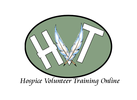Recruitment ads for hospice volunteers consistently proclaim the rewards of helping others. Surprisingly, very little is said about how the volunteer and all the hospice staff are the ones whose spirituality is enhanced once given the opportunity to work with the hospice patients.
There are no fireworks and harps paying tribute to your selflessness as you sit with the dying patient or care for an overly tired caregiver. The magic of hospice lies in the moments of silence. The silence is a tool and the foundation for the act of being present; witnessing the validity of life and the tragedy of broken hearts.
What is Their Story?
Walking into the hospital room, a middle aged woman looked up from her task of feeding lunch to her mother. She seemed startled that I was there. Just a couple of hours earlier this daughter was the one requesting I come speak to her and her father about hospice services for her mother.
Doctors do a fine job of explaining the need for hospice but until the family understands and agrees, nothing will happen in the way of a hospice admission. My job as a hospice care consultant is to go to the family wherever they are - home, hospital, long term care facility - and explain the benefits of hospice.
I have always considered this initial consultation as being the most important conversation in the cycle of hospice services. It can be the end or the beginning of the end of life conversation but without appropriate understanding, the chance to participate in a benefit that increases the comfort and peace a patient and family will feel during this crises can be compromised with the initial conversation.
Walking into the room, the daughter was courteous but distracted. Feeding her mother was not the focused effort although she attempted to make it appear that way. I immediately recognized the daughter was looking at her father. She was fearful about the ensuing conversation and the affect it would have on him. The daughter didn't say it but I could hear her fears with my heart.
The father was an elderly gentleman who was busy doing small tasks like tidying the area next to the hospital bed, straightening the covers over his wife's feet, and intermittent moments of staring out the window. The view was taking his attention. It was not a tremendous landscape or sunset. The view was a memory of him and his wife during a lifetime of living.
I apologized for interrupting the meal and began to back out of the room.
My day had been hectic and started with a change of scheduled appointments. Starting in one county to make visits to doctors to talk about why they should refer to hospice and ending up in an entirely different county to provide a hospice consultation and now I would have to wait. The daughter and father had no idea that this slight change in my schedule included an hour long drive to the hospital and the longer I had to wait the longer it would be before going home. Hot weather, tired feet from following what seemed like acres of hospital hallways to find this patient, and starting to feel the emptiness of my own hunger, I knew my personal agenda could not play a part in this conversation.
All my own issues dissipated when I noticed the man sit on the bed beside his wife as his daughter fed her.
What is their story?
This seems like the magical question that comes to mind anytime I do a consultation. I really want to know who the people are and especially who they thought they once were. While it was true that I was an hour from home, it was also true that this family was an hour from home. We lived in the same county yet I had to drive 50 miles to do the consultation in the hospital. I mentioned the fact we were both quite a long way from home as I was backing out the door and all of a sudden I was invited back into the room and into their lives.
The husband spoke of meeting his bride to be at a a company picnic more than 60 years ago and courting the old fashioned way. He took her as his bride and made her his life. They lived comfortably surrounded by the love of family and friends. There were no words spoken about clinical expectations of hospice and only a few words discussing needs for personal care and nursing assistance. They were open to a chaplain visit but felt they had plenty of spiritual support from their local church and community of friends. The volunteer services would be nice should the daughter or father need to go to town to run errands. I remember wishing I could be their volunteer. There was so much life to value here and the remembrances came so easily.
I grew tremendously that day as I found a way to eliminate by own personal frustrations by asking "what is their story?". The lesson has been with me for every consultation and does not dissapoint me with the resulting answer to the question. This husband could still see his wife as a beautiful young woman who was vibrant, fun loving and his partner in all things. He saw a beauty that I thought I could physically see by the time I left the hospital room. Wrinkles and gray could not camouflage the beauty of this couple even now as the young bride of more than 60 years waited in a hospital bed for her last days in this partnership.
Later that night, I kissed my husband and told him I loved him. I made the kind of wish you make as you blow out the candles of a birthday cake. I wished for us to forever see each other's beauty.
That's what hospice does for you.








